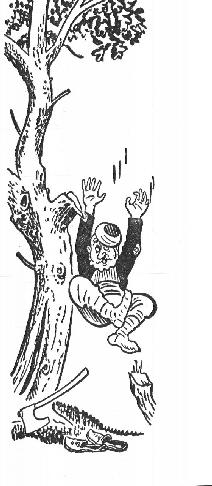
Back to Jeremy Schiff's personal homepage
Back to Jeremy Schiff's Hodja homepage
Back to "Once the Hodja" mainpage
CLING-CLANG," rang the axe of Nasr-ed-Din Hodja, high in the mulberry tree. The Hodja was sitting astride a limb, his long black coat rolled to his waist, and his legs, in their baggy yellow pantaloons, swinging back and forth in time to his chopping.
"Khayr olsoun, Hodja Effendi!" called a voice from below.
"Khayr olsoun, Halil Effendi!" The Hodja leisurely shifted his balance on the limb. Resting on his axe, he arranged his turban which had twisted awry.
"You are going to fall out of that tree!" warned Halil.
The Hodja grinned. He was good-natured but unconcerned.
"But you really will," pleaded Halil. Look where you are sitting!"
"You better look where you are walking," countered the Hodja. "People who along looking into the treetops and clouds are sure to stub their toes."
"But look where you are chopping!" begged Halil.
"Cling-clang," sounded the axe of Nasr-ed-Din Hodja.
"You better look where you are -" began the Hodja. But he never told Halil where to look.
Crash! Down came the limb. Down came the axe. Down came Nasr-ed-Din Hodja. He had been too busy and too stubborn to notice on which side of the cutting he had been sitting.
After the first groans and the first rubbing of bruises, the Hodja had a sudden thought.
"You are a wise man, Halil Effendi," the Hodja said. "You told me when I was going to fall. You are a prophet and the son of a prophet. Tell me, now, when I am going to die."
"After your donkey brays four times, said Halil. He was so disgusted with the simple old Hodja that he thought any answer would do.
Too bruised and shaken to work any more, the Hodja swung his leg over his little gray donkey's back and started for home.
After they had gone a little distancc the donkey thought of the manger of hay and of its baby donkey at home. It stretched out its neck and brayed. Suddenly the Hodja remembered Halil' prophecy. Halil had been right about the fall from the mulberry tree. He must be a true prophet.
"Aman, aman!" shivered the Hodja as the bray shattered the stillness. "I am one fourth dead!"
A bit farther on the road, they met another donkey and rider. The Hodja's little animal brayed a friendly greeting.
"Vai, vai!" shuddered the Hodja. "I an one half dead!"
On they jogged. The donkey began thinking of the brook where it would soon be drinking. It had been a hot day and the water would taste cool and good. It let out a bray of anticipation. The Hodja tried to muffle that third bray, but the bray of a donkey is not to be muffled.
"Aman, aman!" The Hodja's groans were like a dirge as the bray shook him. "I am now three fourths dead!"
Unhappily, like a cat who has lost eight of its nine lives, the doomed Hodja rode on. He patted the donkey and chatted to it to divert the little animal from another bray. He thought of the years ahead when he would have to anticipate the donkey's every want to keep it from giving that last fatal bray. He wondered if there was any way to cut out a donkey's bray without hurting the little beast of whom he was so fond. He must ask Halil about this. Halil was a prophet and the son of a prophet. He knew everything.
There were voices ahead, the voices of men shouting orders to their donkeys. The ears of Nasr-ed-Din Hodja's friendly little donkey pricked forward. It sniffed. It must let its donkey friends know it was coming. Loud and long was the donkey's bray of greeting. It was the fourth bray of the donkey.
"Aman, aman!" screamed the Hodja as he toppled from his donkey. "I am dead! I am dead!"
The men of the approaching caravan rushed forward. They picked up the limp Hodja. They shook him. They shouted at him. They poked him. They pinched him. He was as limp as an empty saddlebag.
"He said he was dead," argued the men "Surely he must know."
"We must take him to his own village," said they.
They loaded the limp body of the Hodja onto his own donkey. With his long striped girdle they bound him to the donkey's saddle They turned back toward Ak Shehir discussing how to break the sad news to Fatima.
On their way, they came to a path which seemed to be a short cut to the village.
"The short cut is too muddy," said one of the men.
"But the longer road is too rocky," said another.
"The short road saves an hour's journey," said a third.
"There is a cool spring by the long road," said a fourth.
On and on they argued, until -
"When I was alive," began Nasr-ed-Din Hodja.
The men stared with open-mouthed wonder and fear. The Hodja was sitting up on his donkey's back, quite unable to keep out of a good argument.
"When I was alive, we always went this way." The Hodja pointed to the shorter path. The men shouted at their donkeys and disappeared in a rapid thud of small hoofs.
Home again by the short cut, Nasr-ed-Din Hodja sat long over the warmth in his mongal, pondering. Dead or alive - which was he?

Back to Jeremy Schiff's personal homepage
Back to Jeremy Schiff's Hodja homepage
Back to "Once the Hodja" mainpage